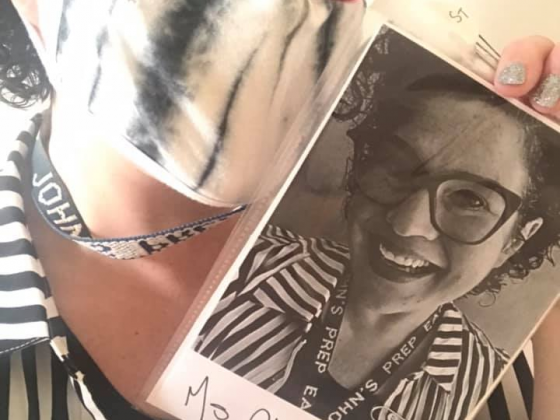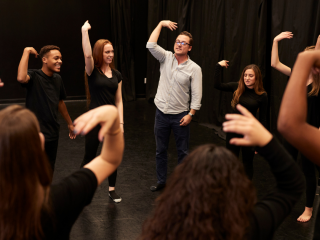When you think of extreme activities that push your body to the edge, acting may not be at the top of the list. But believe it or not, acting can be quite punishing when it isn’t done safely. Actors are routinely called upon to perform demanding feats either physically, vocally, emotionally, or sometimes all the above! And we don’t often factor in the toll that unhealthy execution of these things can have on our physical instrument, especially our voice.
It’s not uncommon for actors to have to yell, scream, or cry onstage. After all, drama is all about heightened emotions. But the voice is a fragile thing, and performing vocal extremes night after night can lead to temporary or even permanent vocal damage. A vocal extreme is anything outside the norm of what our voices normally do: shouting, yelling, screaming, vomiting…even laughing can be a vocal extreme. Actors don’t often realize that there is a technique to doing these things safely. Let’s take a look at some vocal extremes and how to execute them safely.
Keep in mind that this is only meant to serve as a brief overview of healthy vocal extremes. You should consult with a vocal coach if you’re ever unsure about how to use your voice safely onstage.

Some General Tips
One of the best ways to ensure vocal health is to get in the habit of warming up before every single performance. This means warming up physically and vocally. You can develop the warmup routine that works best for you, but a good warmup should be at least five minutes of stretching, breathing, and warming up the voice. Humming is a great way to wake up the vocal folds. And don’t forget the face! Your face has a lot of muscles that are involved with vocal production, from the jaw to the tongue. Remember to stretch those muscles by gently raking your jaw right where it hinges. Then stick your tongue out as far as you can.
And don’t forget your breath! Using good breath support is one of the best things you can do for your voice. Warm up your breath by breathing in and out, taking deep breaths each time. Feel your ribcage expand as you fill it with air. You’ll want to get in the habit of supporting every vocal extreme you execute with your breath. More on that in a moment.
The key with any safe vocal extreme is to make sure that your body, especially your neck, is nice and loose. Physical straining will lead to vocal straining. While some actors have the impulse to “muscle” it and go super intense in extreme moments, you should actually strive for staying as physically loose as possible.
Shouting
Screaming and shouting can create some memorable moments on stage. Who could forget Stanley’s iconic “Stella!” in A Streetcar Named Desire? Unfortunately, screaming is also a leading cause of vocal strain and injury. If you’ve ever had to scream on stage and felt hoarse afterward, you know what I mean. One of the best ways to safely execute a scream is to think of it as making a loud open vowel sound. Use your mouth as a megaphone, keeping the sound out of your throat. You should also start off your scream by using your breath to make an “h” sound (think Santa Clause’s “ho ho ho”). This will help provide the proper breath support you need to execute the scream safely.
If you want to give your scream some “color”, try using your tongue. Play around with moving your tongue around while screaming and see how it affects the sound you produce. You can also adjust the vowel sound you use to color the scream. Try moving from an “ah” to an “oh” sound, or vice versa.
Here’s a quick video that illustrates how to scream safely. It is oriented towards singers, but it’s helpful for actors as well.
Laughing
You might not think of laughing as a vocal extreme, but prolonged laughing can strain your vocal folds just as much as screaming. Similar to screaming, you can think of laughing as an open vowel sound as well (you’re probably noticing a theme here). Again, the goal is to keep the sound out of your throat and vocal cords and resonate in your mouth, nose, or chest. Think of Santa Clause’s hearty “ho ho ho”…it comes from deep down in the belly and has a nice open vowel sound. Of course, you can make it your own by using a different vowel sound and coloring the laugh with your tongue, but when it comes to laughing on stage, be like Santa.
Vomiting
The day may come when you’re called upon to (hopefully) fake vomit on stage. God of Carnage has an infamous vomiting scene. Gruesome Playground Injuries also has a scene requiring the actors to “vomit”. Actors who try to make vomiting sounds can strain their vocal folds, so it’s important to vomit safely. Again, think open vowel sounds and plenty of breath support. Your physicality is what will really sell it, so focus on that instead of hyper-realistic sounds, which can damage your voice. And, while I’m loath to ever prescribe a specific acting technique, I’d highly advise against going Method here.
Do’s and Don’ts for Vocal Care
Remember, your voice is just like any other part of your body and needs to be regularly cared for. Here are some helpful hints to keep your voice performing at its peak and minimize potential damage when performing:
- Do drink plenty of water while avoiding harsher drinks like caffeine and alcohol.
- Don’t smoke or expose yourself to second-hand smoke.
- Do get plenty of rest. Physical fatigue can lead to vocal fatigue.
- Don’t overuse your voice. Practice vocal rest when you can if you’re performing in a vocally demanding show.
- Do pay attention to what your voice is telling you. If you find yourself getting hoarse or if your voice feels strained, rest it and see what adjustments you can make to execute vocal extremes healthfully.
Remember, as an actor your voice is one of your most valuable assets! Think about how you’d care for a hundred-dollar musical instrument. That’s the same level of care you should treat your voice with. Maintaining it and using it safely will serve you well, both on stage and off.














